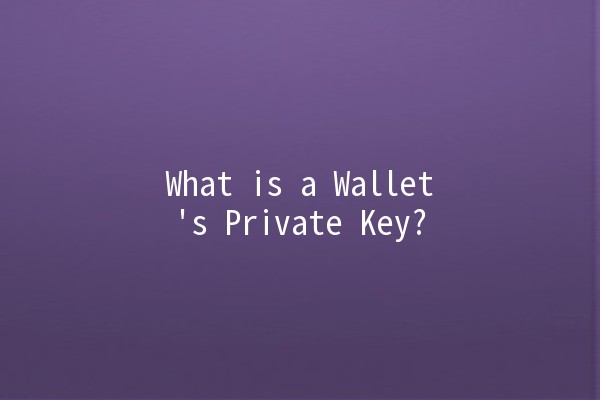
In today's digital age, understanding the nuances of cryptocurrency is crucial for both enthusiasts and casual users alike. One of the fundamental components of any cryptocurrency wallet is the private key. This article aims to explore the concept of private keys, their significance, and practical applications for users looking to enhance their security measures and usability in the crypto space.
Understanding Private Keys
A private key is a secret number that allows a user to access their cryptocurrency wallet and manage their coins. This key is essentially a long string of alphanumeric characters generated by the wallet software, which is mathematically linked to your wallet's public key. Unlike the public key, which can and should be shared with others to receive cryptocurrency, the private key must be kept confidential at all times to secure your funds.
The Importance of Private Keys
The security of your cryptocurrencies hinges on the safety of your private key. If someone else gains access to this key, they gain full control over your wallet and can transfer all your assets to another account. Thus, keeping your private key secure is paramount in safeguarding your digital assets.

Techniques to Enhance Private Key Security
To ensure the security of your private keys, consider the following techniques:
Hardware wallets, such as Trezor or Ledger, are dedicated devices that store your private keys offline. This adds a layer of protection against online threats, making it difficult for hackers to access your keys.
Example: If you are holding a significant amount of cryptocurrency, investing in a hardware wallet can provide peace of mind, as it keeps your private keys away from online vulnerabilities.
When creating a wallet, always use a strong, unique password. This password should combine uppercase letters, lowercase letters, numbers, and special symbols.
Example: Using a password manager can help you generate and store complex passwords, reducing the risk of passwordrelated security issues.
Whenever possible, enable 2FA on your cryptocurrency accounts. This adds an extra step to your login process, typically requiring a verification code sent to your mobile device.
Example: If someone attempts to log into your account with just your private key, they would be thwarted without access to your phone for the 2FA code.
Regularly back up your wallet data and private keys. Backup files should be stored in secure locations, away from your primary devices, to prevent loss due to theft or hardware failure.
Example: Use encrypted USB drives or cloud services with endtoend encryption to keep your backup secure yet accessible.
Be vigilant about potential phishing scams that try to lure you into disclosing your private key or other sensitive information. Always verify the source of any links or requests for your information.
Example: If you receive an email claiming to be from your wallet provider, directly visit their official website to ensure the email’s legitimacy instead of clicking links.
Frequently Asked Questions
Losing your private key means losing access to your cryptocurrency. Without it, you cannot recover your wallet or access your funds. Unlike traditional banking, there is no recovery mechanism for lost private keys in the cryptocurrency space.
No, private keys cannot be recovered once lost unless you have backed up your wallet or the recovery phrase. Always ensure you store your backup information securely before you need to access it.
Yes, sharing your public key is safe and necessary to receive funds. However, never share your private key, as it grants full access to your cryptocurrency holdings.
Most wallets automatically generate a secure private key upon creation. Ensure you use wallets from reputable providers that follow best practices in cryptographic security to enhance the security of your generated keys.
A private key is a long string of characters directly linked to your specific wallet. A seed phrase, often made up of 1224 words, is a more userfriendly method to recover wallets. It can generate the same private keys associated with the wallet.
While you cannot change a private key in the traditional sense, you can create a new wallet and transfer your assets to regenerate a new private key. This might be useful if you suspect your old key has been compromised.
Key Takeaways on Managing Private Keys
Understanding wallets and their private keys is essential for anyone engaging with cryptocurrencies. By implementing robust security measures and remaining vigilant against scams, you can improve the safety of your digital assets. Always remember that the responsibility of safeguarding your cryptocurrency ultimately lies with you. Take the necessary precautions, stay informed, and your investing experience can be both profitable and secure.

